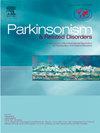颈张力障碍抑郁和焦虑筛查工具的诊断准确性
IF 3.1
3区 医学
Q2 CLINICAL NEUROLOGY
引用次数: 0
摘要
尽管抑郁和焦虑具有很高的患病率和影响,但它们并没有被常规筛查,而且在成人发病的肌张力障碍中,筛查程序的准确性尚不清楚。我们评估了特发性颈肌张力障碍(CD)患者抑郁和焦虑的自评量表的准确性参数。方法从美国、加拿大、澳大利亚和英国的10个运动障碍中心招募了210例特发性CD患者。在每个肉毒杆菌毒素周期结束时,参与者接受成人标准迷你国际神经精神病学访谈(MINI)作为抑郁和焦虑的参考标准。参与者完成了8项自我管理的指数工具(2项用于抑郁,2项用于焦虑,4项用于两者的联合筛查)。计算所有仪器的敏感性、特异性、阳性和阴性预测值、受试者工作特征曲线下的协变量调整面积(AUC)和似然比。结果在MINI中,8.6%(100%为女性)符合当前重度抑郁障碍的标准,10.5%(91%为女性)符合恐慌、社交焦虑或广泛性焦虑障碍中的任何当前障碍的标准。对于抑郁症筛查,所有工具的AUC都高于0.80,其中两个最准确的是BDI-II (AUC 0.91,灵敏度87.5%)和HADS-Depression (AUC 0.88,灵敏度93.7%)。对于焦虑筛查,唯一显示临床有用的工具是HADS-Anxiety (AUC 0.82,敏感性86.3%)。结论使用不同的自我给药量表对CD患者进行重性抑郁筛查具有较高的准确性,而现有的焦虑筛查工具表现较差。肌张力障碍专用仪器不如为一般人群开发的量表准确。本文章由计算机程序翻译,如有差异,请以英文原文为准。
Diagnostic accuracy of screening tools for depression and anxiety in cervical dystonia
Introduction
Despite their high prevalence and impact, depression and anxiety are not routinely screened for, and accuracy of screening procedures is unknown in adult-onset dystonia. We evaluated accuracy parameters of selected self-rated scales for depression and anxiety in patients with idiopathic cervical dystonia (CD).
Methods
Two-hundred-and-ten patients with idiopathic CD were recruited from 10 movement disorders centers from the US, Canada, Australia, and UK. At the end of each botulinum toxin cycle, participants were administered the Adult Standard Mini-International Neuropsychiatric Interview (MINI) as reference standard for depression and anxiety. Participants completed 8 self-administered index instruments (2 for depression, 2 for anxiety, and 4 combining screening for both). Sensitivity, specificity, positive and negative predictive values, covariate-adjusted area under the receiver operating characteristic curve (AUC), and likelihood ratios were calculated for all instruments.
Results
On the MINI, 8.6 % (100 % female) fulfilled criteria for current major depressive disorder and 10.5 % (91 % female) fulfilled criteria for any current disorder amongst panic, social anxiety or generalized anxiety disorders. For depression screening, all tools had an AUC higher than 0.80, with the two most accurate being the BDI-II (AUC 0.91, sensitivity 87.5 %) and the HADS-Depression (AUC 0.88, sensitivity 93.7 %). For anxiety screening, the only instrument showing clinical usefulness was the HADS-Anxiety (AUC 0.82, sensitivity 86.3 %).
Conclusion
Current major depression can be screened in CD with high degree of accuracy using different self-administered scales, whereas existing screening tools for anxiety perform worse. Dystonia-specific instruments are less accurate than scales developed for the general population.
求助全文
通过发布文献求助,成功后即可免费获取论文全文。
去求助
来源期刊

Parkinsonism & related disorders
医学-临床神经学
CiteScore
6.20
自引率
4.90%
发文量
292
审稿时长
39 days
期刊介绍:
Parkinsonism & Related Disorders publishes the results of basic and clinical research contributing to the understanding, diagnosis and treatment of all neurodegenerative syndromes in which Parkinsonism, Essential Tremor or related movement disorders may be a feature. Regular features will include: Review Articles, Point of View articles, Full-length Articles, Short Communications, Case Reports and Letter to the Editor.
 求助内容:
求助内容: 应助结果提醒方式:
应助结果提醒方式:


